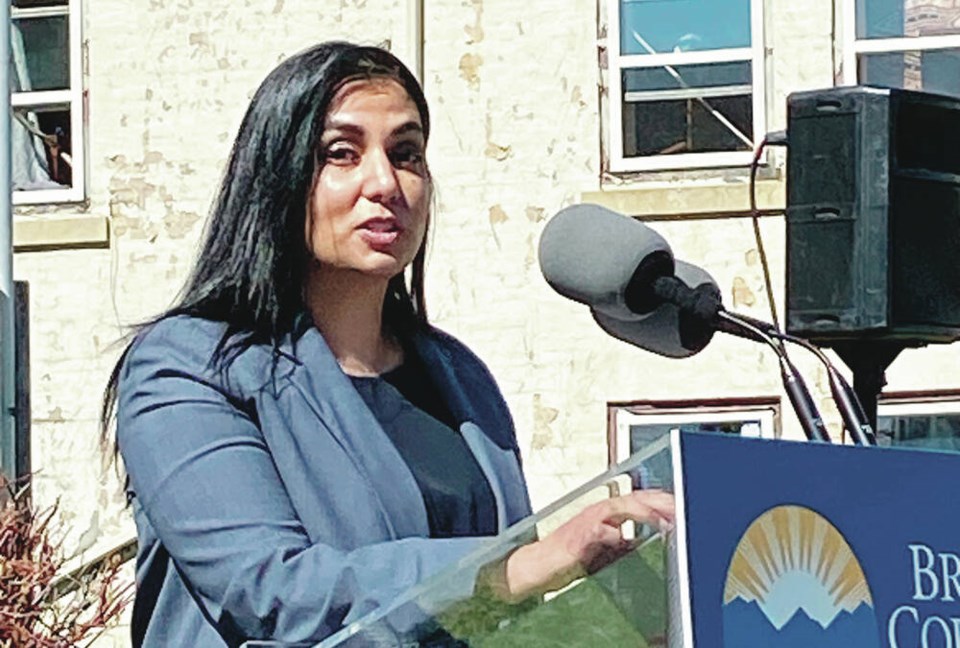The NDP government’s new mantra in the escalating argument about violent criminals who re-offend while awaiting trial is: “We have the strictest bail policy in Canada.”
Attorney General Niki Sharma chanted it no fewer than seven times on Tuesday during questioning in the legislature.
“We have the strictest bail policy in all of Canada. … I mentioned earlier about having the strictest bail policy in all of Canada. … We have the strictest bail policy, as I mentioned, in all of Canada.”
While that was going on, Premier David Eby was asked in Vancouver about the issue. Part of his response was — you guessed it: “We put in place the strictest directive to our Crown [counsel] in Canada.”
But the data released Monday from the B.C. Prosecution Service about how that directive is working makes you wonder. The reason the attorney general and premier are dwelling on it is because there are so many skeptical questions about it.
The service stressed that “no clear conclusions can be drawn” because the preliminary data is very skimpy.
But that undercuts the NDP’s mantra. If an early look at partial data doesn’t conclusively prove anything, how can they claim it’s the strictest policy in Canada?
The B.C. Prosecution Service also noted: “It would be unreasonable to assume that a policy change alone could produce any particular outcome at a bail hearing.”
That detracts further from the party line. The independent agency in charge of “the strictest bail policy in Canada” seems to be warning against assuming it makes any difference at all.
Policy is one thing. Day-to-day impact in the B.C. courts is another.
Eby said Tuesday the data reflects that when Crown counsel determine that when someone accused of a violent crime with a track record of breaching bail should be kept in jail, judges concur only half the time.
But another key finding is that the Crown only asks for pre-trial incarceration for violent offenders about half the time. That reduces the share being held in custody even further. Only about a quarter of the cases involving violence and previous offences get pre-trial detention.
Eby said it is a matter of federal law, so he and other premiers are waiting for a promised amendment to the Criminal Code.
Opposition BC United MLA Mike de Jong said if the government doesn’t ask for someone to be detained in jail, they won’t be, and asked why “they don’t even bother to ask” half the time.
BC United critic Elenore Sturko said the government is manipulating the numbers.
Sharma said the prosecution service’s early data shows “that when Crown has made an assessment that public safety is at issue or the public confidence in the justice system is at issue and they’re seeking detention, in a majority of time, that’s denied.”
But she said “it’s the law of the land under the Criminal Code, which is the federal government.”
The tougher bail directive that focused all the attention on the issue has an odd history.
Directives to the strictly independent B.C. Prosecution Service are rare. The Opposition started advocating that approach last year. The NDP, which initially disputed that “catch and release” was a serious problem, were barely lukewarm about the idea.
An independent look at violent street crime by experts Doug Lepard and Amanda Butler heightened the sense of crisis.
De Jong started pitching the concept of officially directing prosecutors to get tougher in bail hearings. The NDP stayed mute.
But then Eby launched his 100-day action plan right after being sworn in as leader. One of his first highlights was a revelation that then-attorney general Murray Rankin had issued the directive.
Whatever it accomplished, the promised federal Criminal Code amendment will be the next step.
But even that has a big “subject to” attached. It’s the Supreme Court of Canada that has the most clout, as always. Previous rulings about the incarceration rate for Indigenous people guide bail policy, and make restricting it a thorny problem.
Just So You Know: Blueberry River First Nation’s rights were violated by the B.C. government, not a treaty, as was stated here last week. Also in that column, that nation’s court win in 2021 was conflated with the overall treaty land entitlement announced last week, when they were separate processes. My regrets for the errors.




